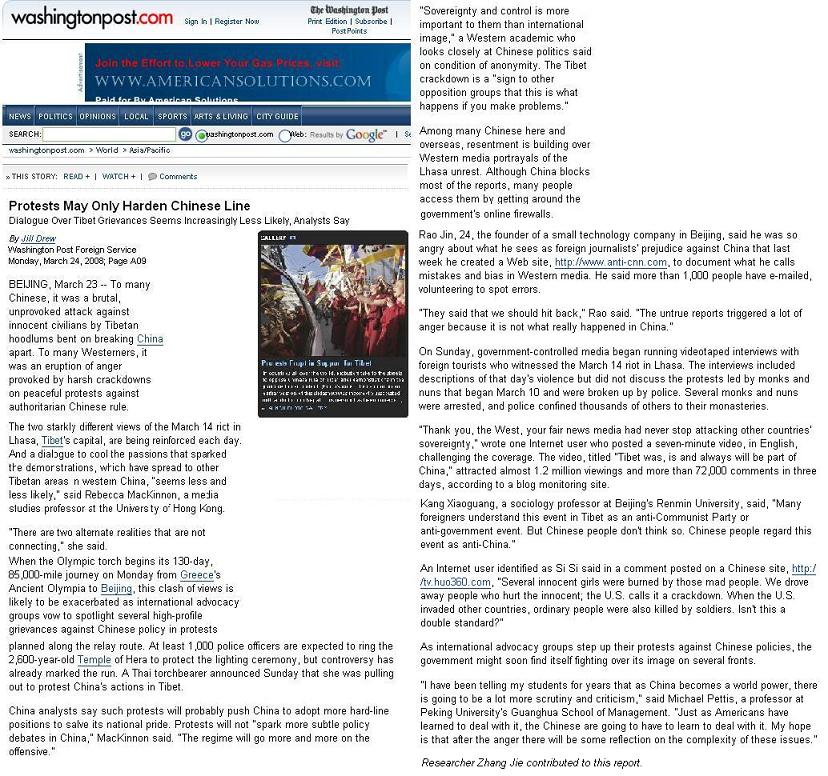外文主流媒体对Anti-CNN.com 相关报道翻译帖(五)
【原文連接】http://www.washingtonpost.com/wp ... R2008032301595.html
【翻譯】 ltbriar
【聲明】本文翻譯僅限Anti-CNN使用,謝絕轉載。
【原文】Protests May Only Harden Chinese Line
Dialogue Over Tibet Grievances Seems Increasingly Less Likely, Analysts Say
By Jill Drew
Washington Post Foreign Service
Monday, March 24, 2008; Page A09
BEIJING, March 23 -- To many Chinese, it was a brutal, unprovoked attack against innocent civilians by Tibetan hoodlums bent on breaking China apart. To many Westerners, it was an eruption of anger provoked by harsh crackdowns on peaceful protests against authoritarian Chinese rule.
The two starkly different views of the March 14 riot in Lhasa, Tibet's capital, are being reinforced each day. And a dialogue to cool the passions that sparked the demonstrations, which have spread to other Tibetan areas in western China, "seems less and less likely," said Rebecca MacKinnon, a media studies professor at the University of Hong Kong.
"There are two alternate realities that are not connecting," she said.
When the Olympic torch begins its 130-day, 85,000-mile journey on Monday from Greece's Ancient Olympia to Beijing, this clash of views is likely to be exACerbated as international advocacy groups vow to spotlight several high-profile grievances against Chinese policy in protests planned along the relay route. At least 1,000 police officers are expected to ring the 2,600-year-old Temple of Hera to protect the lighting ceremony, but controversy has already marked the run. A Thai torchbearer announced Sunday that she was pulling out to protest China's actions in Tibet.
China analysts say such protests will probably push China to adopt more hard-line positions to salve its national pride. Protests will not "spark more subtle policy debates in China," MacKinnon said. "The regime will go more and more on the offensive."
ad_icon
"Sovereignty and control is more important to them than international image," a Western academic who looks closely at Chinese politics said on condition of anonymity. The Tibet crackdown is a "sign to other opposition groups that this is what happens if you make problems."
Among many Chinese here and overseas, resentment is building over Western media portrayals of the Lhasa unrest. Although China blocks most of the reports, many people access them by getting around the government's online firewalls.
Rao Jin, 24, the founder of a small technology company in Beijing, said he was so angry about what he sees as foreign journalists' prejudice against China that last week he created a Web site, http://bbs.m4.cn, to document what he calls mistakes and bias in Western media. He said more than 1,000 people have e-mailed, volunteering to spot errors.
"They said that we should hit back," Rao said. "The untrue reports triggered a lot of anger because it is not what really happened in China."
On Sunday, government-controlled media began running videotaped interviews with foreign tourists who witnessed the March 14 riot in Lhasa. The interviews included descriptions of that day's violence but did not discuss the protests led by monks and nuns that began March 10 and were broken up by police. Several monks and nuns were arrested, and police confined thousands of others to their monasteries.
"Thank you, the West, your fair news media had never stop attacking other countries' sovereignty," wrote one Internet user who posted a seven-minute video, in English, challenging the coverage. The video, titled "Tibet was, is and always will be part of China," attracted almost 1.2 million viewings and more than 72,000 comments in three days, according to a blog monitoring site.
Kang Xiaoguang, a sociology professor at Beijing's Renmin University, said, "Many foreigners understand this event in Tibet as an anti-Communist Party or anti-government event. But Chinese people don't think so. Chinese people regard this event as anti-China."
An Internet user identified as Si Si said in a comment posted on a Chinese site, http://tv.huo360.com, "Several innocent girls were burned by those mad people. We drove away people who hurt the innocent; the U.S. calls it a crackdown. When the U.S. invaded other countries, ordinary people were also killed by soldiers. Isn't this a double standard?"
As international advocacy groups step up their protests against Chinese policies, the government might soon find itself fighting over its image on several fronts.
"I have been telling my students for years that as China becomes a world power, there is going to be a lot more scrutiny and criticism," said Michael Pettis, a professor at Peking University's Guanghua School of Management. "Just as Americans have learned to deal with it, the Chinese are going to have to learn to deal with it. My hope is that after the anger there will be some reflection on the complexity of these issues."
Researcher Zhang Jie contributed to this report.

【中文翻译】
示威抗议可能只会使中方强硬
分析家称, 西藏问题的对话似乎愈加不可能
作者: Jill Drew 华盛顿邮报海外服务
2008年3月24日, 星期一, A09页
北京, 3 月23 – 对许多中国人来说, 这是西藏流氓野蛮, 无端攻击无辜平民, 旨在分裂中国的行为。对许多西方人来说, 这是因专制中国统治严厉镇压和平示威所爆发的愤怒。
对3月14日西藏省府拉萨动乱南辕北辙的不同看法正每天在加强中。香港大学传媒研究教授丽贝卡.麦金农(Rebecca MacKinnon)说, 能让点燃这次示威蔓延到中国西部西藏其他地区的情绪冷却的对话, “看来愈来愈不可能。”
“有两个不连接的现实交互为用”她说。
自从星期一奥林匹克火炬从希腊古奥林匹克开始它130天, 85,000里路程传递往北京时, 这对立的看法必然为国际激进份子誓言在传递路线上计划示威来聚焦在对中国政策不满的几个重点而被加剧的。估计至少会有1000名警察包围2600年历史的希拉女神庙以确保点燃仪式, 但传递早就注定有矛盾了。星期日一名泰国火炬手宣布她退出以抗议中国对西藏的行动。
中国分析家说这些抗议只会逼中国采取更强硬立场来保存它的国家尊严。麦金农说:“示威不会’在中国引发更多柔和政策讨论, 政府只会愈来愈对抗。”
“对他们来说, 主权和控制是比国际形象更为重要”一位长期关注中国政治不透露身份西方学者说, 西藏镇压是“对其他反对组织作杀鸡儆猴的下场警告。”
本地及海外许多华人对西方媒体对拉萨的描述反感愈来愈大。虽然中国封锁大部份报导, 许多人绕过政府线上封锁而获知消息。
24岁的饶谨是北京一家小型科技公司创办人, 他说上周他对他认为是外国传媒对中国的偏见感到愤怒而架设了一个网站, http://bbs.m4.cn, 用来记录他称为西方传媒的错谬偏见。他说有超过1,000人发电邮给他, 自愿参抓弊工作。
“他们说我们应还击”饶谨说“那些不实报导触怒许多人, 因为那不是在中国发生的实况。”
星期日, 政府控制的媒体开始播放目睹3月14日拉萨动乱的的外国游客的采访录像。采访包括当天暴力事件的描述, 但却没有提及3月10日被警方驱散僧尼为首的示威。有数名僧尼被捕, 警方把其他上千名僧侣隔离在他们的寺院里。
一名网民贴了一段7分钟的短片, 以英文写着“谢谢你, 西方, 你的公正新闻传媒从来就没停止过攻击其他国家的主权”以挑战那些报导。短片名为“西藏过去, 现在, 未来一直是中国的一部份”根据一个博客统计网站, 三天内吸引了差不多120万人次观看, 留言超过72,000条。
北京人民大学社会学教授康晓光 (Kang Xiaoguang) 说:“许多外国人把西藏事件理解为是反共产党或反政府事件。但中国人民不那么看。中国人民把此事视为反华。”
一位具名 Si Si 的网民在中国网站http://tv.huo360.com回应中说:“几个无辜女孩被那些狂徒烧死。我们把伤害无辜的人驱除, 美国人称这是镇压。当美国入侵其他国家, 平民也被军队杀害。这不就是双重标准吗?”
当国际运动组织把他们对中国政策的抗议升级, 政府也许很快发现它在几个战线上为自己形象而战。
“我多年来一直告诉我的学生们, 当中国成为世界强国时, 随之而来肯定是更多监督与批评的。”北京大学光华管理学院教授迈克尔.拜提斯 (Michael Pettis) “就像美国人学会如何处理它, 中国人也将要学如何处理。我的希望是在愤怒之后, 将会对这些问题的复杂性有一定的反思。”
研究员张洁(音译)参与这报导
 |